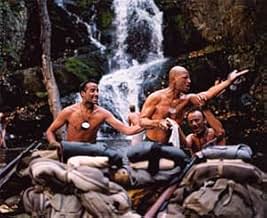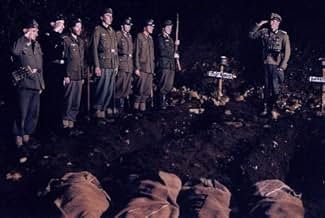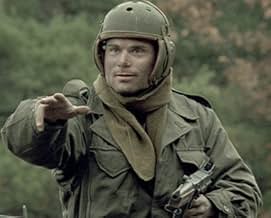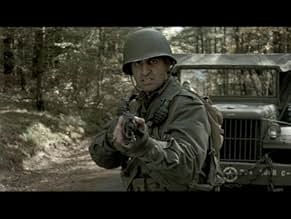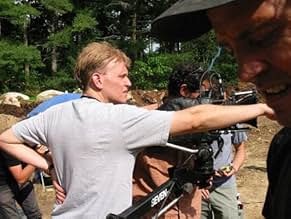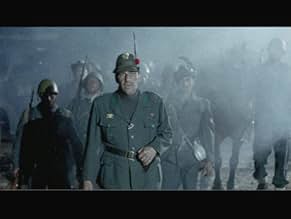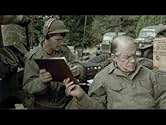Aggiungi una trama nella tua linguaThe story of ordinary men during WWII as seen from three different points of View.The story of ordinary men during WWII as seen from three different points of View.The story of ordinary men during WWII as seen from three different points of View.
- Premi
- 4 vittorie totali
Matthew Black
- Sgt. Hoakes
- (as Mathew Black)
Achim Buchner
- Franz
- (as Achim Beuchner)
Recensioni in evidenza
This is a very entertaining, and affecting, movie that takes the points of view of ground troops on three sides of World War II (American, German, and Italian) -- each coming into contact with the others -- but the movie focuses on their own personal lives which, when compared one to the other are surprisingly similar. The director, Ari Taub, tells this story with a humorous and quirky touch, showing us the human qualities of our enemies and suggesting that if we ever did humanize our enemies wars would be a lot harder to fight.
There are several story lines to follow here, and the film weaves in and out of each effortlessly -- no small feat. With a cast of -- I'm guessing here -- 50 or so speaking roles (each very well played), I was impressed at the skill of storytelling and the scope attempted on a minimal, truly independent, film budget. There is a "light touch" to the comedy in this movie, and while you might find yourself caught up in the exploits and quirky adventures of the different sets of "heroes", there is more at work here than that: without being preachy, Taub is showing us the futility, the madness, and the human comedy that is war.
I enjoyed this movie a lot, and it's worth checking out if it lands at a film festival or video store near you.
There are several story lines to follow here, and the film weaves in and out of each effortlessly -- no small feat. With a cast of -- I'm guessing here -- 50 or so speaking roles (each very well played), I was impressed at the skill of storytelling and the scope attempted on a minimal, truly independent, film budget. There is a "light touch" to the comedy in this movie, and while you might find yourself caught up in the exploits and quirky adventures of the different sets of "heroes", there is more at work here than that: without being preachy, Taub is showing us the futility, the madness, and the human comedy that is war.
I enjoyed this movie a lot, and it's worth checking out if it lands at a film festival or video store near you.
Can you believe a WWII movie was made for so little money?? I can't. I'm so used to the traditional trite Hollywood epics that are all flash and no flavor. This was an unexpected, (though not entirely palatable), treat. Some of the acting was stilted and the effects a bit too cheaply raw, but the heart was there and it shines though the fog.
It takes real guts to portray all sides of such a horrible affair with dignity and respect.
Even Spielberg kept at an arms length on this issue.
Kudos to the brave soul who made this. I'll keep an eye out for upcoming projects for sure...
It takes real guts to portray all sides of such a horrible affair with dignity and respect.
Even Spielberg kept at an arms length on this issue.
Kudos to the brave soul who made this. I'll keep an eye out for upcoming projects for sure...
"The Fallen" at first seems like an old-fashioned World War II movie, opening with almost "Hogan's Heroes"-like humor with "Milo Minderbinder" of "Catch-22" like wheeling-dealing, but gradually develops into a moving and complex portrait of soldiers.
Most English-language films we have seen about GI's interacting with locals have been in French forests, but this is set in the more complex social, political and military environment of northern Italy at the close of the war, dealt with superficially in "Captain Corelli's Mandolin" and almost contemporaneously in Roberto Rossellini's "Paisà", which was also a series of vignettes.
The very large ensemble that gets hard to differentiate individually includes Americans closing in on the Germans who are equally allies and occupiers to Italians buffeted by deposed fascists, Communist partisans, displaced peasants and apolitical criminals, an unusually diverse array of characters who all claim to be nationalists.
Like a Bill Maudlin cartoon, this is war from the GI's eye view; we don't see generals or hear discussions of strategy or tactics, just orders to follow. The American soldiers, as drawn by the script of Nick Day and Caio Ribeiro, are the most stereotyped from old movies, the hulking hillbilly, the Italian guy from Brooklyn who is delegated to do translations and community relations as the locals eagerly ask if he knows their cousins, the alcoholic officer in charge, etc. In the second half of the film, the Americans' portrayal sharpens up as the supply guys in the quartermaster corps are thrust into the front lines for the first time and there's less dialog and more taut action.
The German soldiers are the least stereotyped, despite many close-ups on their black crosses and Heil Hitler salutes. They are shown as professional, competent soldiers doing their job far from home in a crumbling situation, with limited supplies and manpower. Though sounding more like World War I trench movies (and characters on all sides recall relatives who were inspiring veterans), their discussions of the futility of continuing to fight are plausible and add complications to their actions.
The Italians are a mix of stereotypes and complexities. The sex-starved peasant women are just plain silly, and the Army, regardless of accurate issues of unpreparedness, looks like buffoons. The Mafiosi-like thug and his henchmen are the usual, but their interactions with the armies are interesting, even if it is never explained how they've avoided the war up to now. The refugees are both as haunted and resilient as "Mother Courage".
While far less bloody than "Saving Private Ryan", it is unpredictable what will happen to characters we get to care about and is unsparing in showing the personal devastation of war. Debut feature director Ari Taub does the fight scenes very up close and personal, and very effectively portrays a real sense of actual combat, particularly for a low-budget film.
The developing serious tone is undone many times by the melodramatic score which overemphasizes comedic elements of the absurdity of war. Period songs by interesting voices are used effectively throughout.
With each nationality speaking in their native tongues, the subtitles are black-lined and always legible. The subtitles are also thoughtfully provided even when characters are speaking English but with thick accents. Language communication issues are a key part of this story.
Most English-language films we have seen about GI's interacting with locals have been in French forests, but this is set in the more complex social, political and military environment of northern Italy at the close of the war, dealt with superficially in "Captain Corelli's Mandolin" and almost contemporaneously in Roberto Rossellini's "Paisà", which was also a series of vignettes.
The very large ensemble that gets hard to differentiate individually includes Americans closing in on the Germans who are equally allies and occupiers to Italians buffeted by deposed fascists, Communist partisans, displaced peasants and apolitical criminals, an unusually diverse array of characters who all claim to be nationalists.
Like a Bill Maudlin cartoon, this is war from the GI's eye view; we don't see generals or hear discussions of strategy or tactics, just orders to follow. The American soldiers, as drawn by the script of Nick Day and Caio Ribeiro, are the most stereotyped from old movies, the hulking hillbilly, the Italian guy from Brooklyn who is delegated to do translations and community relations as the locals eagerly ask if he knows their cousins, the alcoholic officer in charge, etc. In the second half of the film, the Americans' portrayal sharpens up as the supply guys in the quartermaster corps are thrust into the front lines for the first time and there's less dialog and more taut action.
The German soldiers are the least stereotyped, despite many close-ups on their black crosses and Heil Hitler salutes. They are shown as professional, competent soldiers doing their job far from home in a crumbling situation, with limited supplies and manpower. Though sounding more like World War I trench movies (and characters on all sides recall relatives who were inspiring veterans), their discussions of the futility of continuing to fight are plausible and add complications to their actions.
The Italians are a mix of stereotypes and complexities. The sex-starved peasant women are just plain silly, and the Army, regardless of accurate issues of unpreparedness, looks like buffoons. The Mafiosi-like thug and his henchmen are the usual, but their interactions with the armies are interesting, even if it is never explained how they've avoided the war up to now. The refugees are both as haunted and resilient as "Mother Courage".
While far less bloody than "Saving Private Ryan", it is unpredictable what will happen to characters we get to care about and is unsparing in showing the personal devastation of war. Debut feature director Ari Taub does the fight scenes very up close and personal, and very effectively portrays a real sense of actual combat, particularly for a low-budget film.
The developing serious tone is undone many times by the melodramatic score which overemphasizes comedic elements of the absurdity of war. Period songs by interesting voices are used effectively throughout.
With each nationality speaking in their native tongues, the subtitles are black-lined and always legible. The subtitles are also thoughtfully provided even when characters are speaking English but with thick accents. Language communication issues are a key part of this story.
I really enjoyed this film. It was sad and funny and tragic and many other things as well. It reminded me of the hallelujah trail (Burt Lancaster)with loads of people wandering around looking for each other. Eventually they find each other whether they want to or not and a number of them end up dead (this being unlike the Hallelulah Trail). I liked the way that lots of the characters wanted out but kept on going despite their fears.I imagine this is true of most combatants. Some people are heroes (see Audie Murphies Films)but most people are just people. There were a number of stereotypes but then this is also true of life. Wherever you go you meet people who fit these stereotypes. It was a very human film.
Ari Taub takes on an immense project of independently shooting a war film set during WWII. Despite the numerous industry warnings against doing period films, Ari pulls it off with an engaging film, good characters, and an impressive production design. The production design for this film is stellar. The Italian actors are fantastic creating very engaging and likable characters. I should note here that this film is in three languages (Italian, German and English) and I applaud Ari maintaining this aspect to his story instead of making everyone speak English. The story is good, faithful to the large ensemble genre of post-WWII war film dramas. If anything, this film proves that Ari Taub is a capable, resourceful and ambitious director with a bright future and ability to deliver above expectation and means. "The Fallen" is worth a view and praise for everything accomplished by the cast, crew, and producers making this independent film.
Lo sapevi?
- ConnessioniEdited into Last Letters from Monte Rosa (2010)
I più visti
Accedi per valutare e creare un elenco di titoli salvati per ottenere consigli personalizzati
Dettagli
- Data di uscita
- Paesi di origine
- Sito ufficiale
- Lingue
- Celebre anche come
- Días de sangre y fuego
- Luoghi delle riprese
- Azienda produttrice
- Vedi altri crediti dell’azienda su IMDbPro
Botteghino
- Budget
- 600.000 USD (previsto)
- Lordo in tutto il mondo
- 88.245 USD
- Tempo di esecuzione
- 1h 52min(112 min)
- Colore
- Proporzioni
- 2.35 : 1
Contribuisci a questa pagina
Suggerisci una modifica o aggiungi i contenuti mancanti

